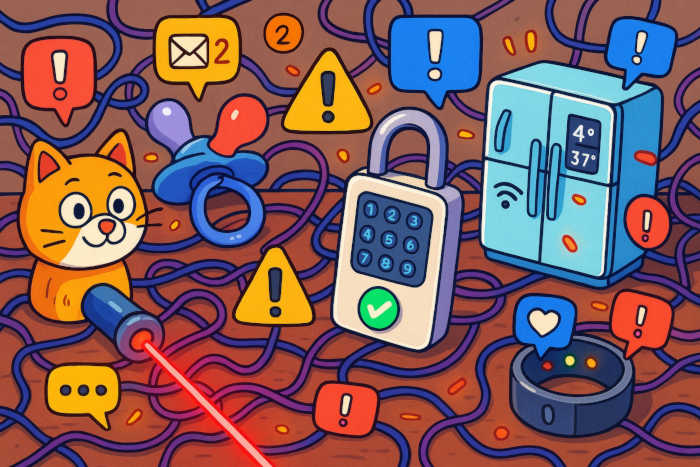From cat lasers to AI-powered pacifiers, consumer IoT promises genius but mostly delivers nonsense. Here’s why the so-called “smart” tech trend is spectacularly off the rails.

A long time ago, in a bubble far away, the godlike tech that would disrupt everything and made everybody who was already rich even richer was the consumer side of the internet of things, which even has its own acronym, CIoT for… what else, “consumer internet of things.” Today, that bubble has been eclipsed by AI but is still all around us, sucking up too many resources — even among FOSS advocates — with non-negligible long-term impacts that many people still fail to see.
The most urgent flaws of CIoT are easy to spot in the examples below, and most FOSS supporters—as well as advocates of open, people-friendly tech—already understand these problems far better than the average consumer. Nearly all of this hardware is proprietary, overpriced, and offers little real functionality. It can fail in many more ways than earlier devices and often could be replaced by a simple phone app. CIoT devices are difficult to maintain, rarely interoperable, pose constant privacy risks, and can be remotely bricked at any time. Also, if you rely on CIoT and lose your phone, you’re left stranded.
On a social level, consumer internet of things is just the third wave of unrecyclable trash dumped on poorer countries, after regular electronics and secondhand clothing.
If this isn’t enough, CIoT has some categories that come with negative long-term effects that I feel are often overlooked — even among FOSS advocates.
The Not-So-Smart World of Consumer IoT
The first kind of CIoT I really dislike is the falsely smart car, but I’ve already criticized here on FOSS Force. After that, I fail to find real value in the CIoT subset of a larger trend I call “Peak Pet,” which can produce a Cat Play Buddy that lets you move — even remotely — a laser pointer around for your cat to chase… or it can do it alone when you’re too busy.
After that comes baby tech for “smart” parenting, which I’ve heard touted as a dramatic improvement to the parenting process — presented as if parenting were some revolutionary business strategy — but is primarily just stress-generating gadgets like:
- baby cameras that alert parents any time the baby cries or her face is obscured
- pacifiers that transmit temperature and location to the parents’ smartphones
Next, there’s the huge “Doctors? Me? Why?” universe, with gems like:
- toilet seats that track bowel movements, urination, and anus status, to report medical conditions
- AI-powered mirrors that haunt you every time you get off those seats with a full health assessment, before reporting it
- AI-powered rings like the Circular Ring 2 that, whenever you’re away from the smart mirrors, converts scores of biomarkers into actionable recommendations like, “Hello… Stay hydrated and eat vitamin C-rich food.”
Finally, there is the “being lonely and far from mommy, but cool” category, a.k.a. “smart home,” with examples like:
- ovens and fridges so smart that they can’t cook or keep veggies fresh without WiFi
- beds that track and report temperature, movements, and whatnot; and mattresses that activate your other smart devices as soon as you step out of bed
- robotic vacuums that can also pick up your socks
- the Ultraloq smart lock that lets “you” — sorry, I meant: “whoever is holding your phone” remotely grant visitors access to your home or — if the smartphone gets closer than a few inches — just enter without keys
- glass holders that buzz if you leave empty glasses on them, instead of immediately bringing them back to the kitchen
- smart pantries that can message you that you’re running out of pepper, or just order it online
Other Dumb (and Dangerous) Consequences of CIoT
Many “smart home” gadgets would actually be good for elderly or disabled people with limited mobility if they were specifically promoted that way. Instead, they mostly seem to target young adults who left home without learning how to clean their room or boil an egg.
Even worse, they seem to be designed to make always being alone look glamorous, and actually almost require living alone. How long would those gadgets last in a home with toddlers who run from room to room or jump on their mom’s bed every day, as toddlers are prone to do (and what effect would all that extra stimuli have on toddlers)? Research indicates that exposure to Alexa-like assistants may negatively impact some critical skills, and I’ve met fifth graders who are unable to go 20 minutes without speaking to Alexa.
Pitching a lock as something that morphs an act as trivial as opening a door — actual text from the Ultraloq page — into “a seamless and convenient entry experience” is quite likely, in the long run, to foster delusion about what’s behind that door. Unless, of course, what’s behind that door is just more CIoT gadgets. Really smart homes are much different.
Ditto for DIY healthcare. Prevention is certainly good, but so is mental balance. Inside hospitals, smart pacifiers with WiFI may replace invasive daily blood draws and smart toilets may reduce nurses’ workloads. But outside hospitals, unless a healthcare professional considers it necessary, being constantly bombarded with personal health data one can’t really understand seems to be more burden than prevention. For most of us, J.K. Jerome’s evergreen advice — “don’t stuff up your head with things you don’t understand” — is healthier advice than “watch the data roll in, grow as a person” (an actual slogan for Circular Ring, a wearable health-tracking device).
As far as pets and parenting go, there is nothing intrinsically wrong with reducing human effort in relationships, but the CIoT of today often goes way too far down that road. Presenting parenting as a business-like “process” demeans parenting, just like the notorious “marketplace of ideas” demeans culture and politics. Markets are places to sell goods or services, and some things are not for sale.
Summing up, there are whole categories of CIoT that seem to be security blankets that increase rather than reduce stress, anxiety, and general dissatisfaction while falling prey to a tendency of our times to only look for personal fixes, instead of seeking universal solutions to problems such as security or healthcare. That’s why most CIoT seems intrinsically stupid to me, and would remain so even in devices built from 100% open source software and hardware.

Marco Fioretti is an aspiring polymath and idealist without illusions based in Rome, Italy. Marco met Linux, Free as in Freedom Software, and the Web pre-1.0 back in the ’90s while working as an ASIC/FPGA designer in Italy, Sweden, and Silicon Valley. This led to tech writing, including but not limited to hundreds of Free/Open Source tutorials. Over time, this odd combination of experiences has made Marco think way too much about the intersection of tech, ethics, and common sense, turning him into an independent scholar of “Human/digital studies” who yearns for a world with less, but much better, much more open and much more sensible tech than we have today.






“The development of full artificial intelligence could spell the end of the human race.”
– Stephen Hawking (1942-2018) – World renowned English theoretical physicist, cosmologist and author who suffered with ALS from age 21.
“I, Robot” (2004)
https://www.imdb.com/title/tt0343818/?ref_=fn_all_ttl_1